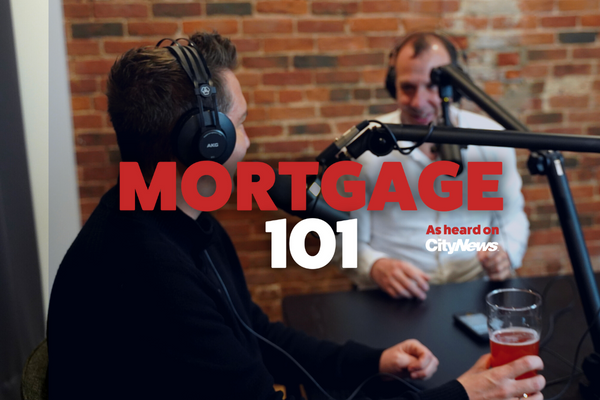Meet Miria Ferguson, our newest member of the Clinton Wilkins Mortgage Team! Miria joins us as an associate mortgage broker

Mortgage 101 – Impacts of consumer confidence| March 20, 2023
The US and Canada have different banking systems but trends in the US may impact Canada more than you think. In this episode, Clinton Wilkins and Todd Veinotte discuss the complex banking system challenges in the US, what makes Canada different and how the trends in the US will impact our market.
Todd Veinotte 00:04
This is Mortgage 101, your guide to homeownership. We’ve been doing this a very long time. Thanks everybody, if you’re listening on radio, we appreciate it very much. And if you’re listening, of course after the fact, through any of the any of the social media platforms, and very informative. We love doing this. Just give everybody, if it’s theirt first time they’re tuning into this, a bit of a what you do Clinton.
Clinton Wilkins 00:24
I’m a mortgage broker here in Halifax, Nova Scotia, I’ve been in the industry for 17 years, we’ve done about $1.3 billion worth of mortgages and over 5100 transactions. So I always say, you know, we’ve seen everything, but then every day we see something new. And I think that’s really interesting about mortgage lending, so many nuances, who would believe that we’d be doing the show on the radio, you know, five, six years later. And we even said before we started our recording here tonight, you know, you’re listening to us on the weekend, Saturday and Sunday, but we just, there’s so much news to talk about. And there’s so much that changes in this industry, there’s so many nuances around mortgage lending, it just makes it very, very interesting. It’s interesting for me, and you know, I think it’s daunting for the consumer. But hopefully, our viewers and our listeners are intrigued with what we have to say. And, you know, hopefully they’re commenting, and hopefully, you know, they’re calling in or send us a message because we’d love to hear what everyone says.
Todd Veinotte 01:17
Well, everything that happens, obviously in the financial industry, whether it’d be back in Canada, or the markets or whatever, it all links into, in many ways, mortgage lending. So there’s that huge connection with the financial industry, I guess that’s it’s not just mortgage lending in a vacuum. Right? It’s so linked with everything else in the financial industry, which is why it can be complex at times.
Bank Of Canada holds the key overnight rate
Clinton Wilkins 01:39
Yeah, it’s very, very complex. And, you know, during the show, we’re going to talk about what’s going on with the Bank of Canada. They had an announcement here, just guessed a week ago, right? And, you know, there’s a lot going on in the US. I think there’s a lot going in the housing market here in Halifax. And you know, I think, you know, it’s important, we need to talk about what’s going on in this rate environment today. So many existing homeowners are talking to us about what’s going on with rates. So many people are coming up for renewal. And you know, it is a trying time. So I think it’s getting that expert advice. And asking some questions is going to be important.
Todd Veinotte 02:16
So when it comes to the mortgage rate, we’ll tackle that right away. It was held for the first time in a number of months now. 4.5%, I do believe is where it’s at.
Clinton Wilkins 02:24
Yeah, so right now the key overnight rate is 4.5 and the bank prime rate is 6.7. So if you have any consumer credit, that’s tied to that key overnight rate, the prime rate is 6.7. And that was maintained the same here in March, and the Bank Of Canada is meeting again, the middle of April. So April 12, they’re going to do another announcement. Many economists are predicting that we’re also going to see a hold. But there’s been a bit of a segue.
The United State’s complex banking system
Clinton Wilkins 02:51
So in the US you know, there’s been a couple collapses of some relatively large banks. The US banking system is very complex compared to what goes on in Canada. We have a very stable system, we have five, six big banks in Canada, where in the US, they have hundreds and hundreds of banks. Where they are very regulated in the US, they still have a different risk appetite. And you know, things go very well for them. And things can go very poor for them. So having a bank collapse is not necessarily unusual in the US.
Todd Veinotte 03:25
So you say risk appetite, drill down more into what you mean by risk appetite.
Clinton Wilkins 03:28
You know I think there’s some banks that maybe are more focused on credit lending, there’s some banks that are focused more on like deposit taking. You know, I think there’s very like niche and unique banks that serve a very small pieces of different communities, etc. And there’s a couple banks that actually have gone under now in the US, due to competence, really, with their consumers. You know what I mean? One of the big ones that we were really talking about is Silicon Valley Bank. And they had a traditional run on the bank, and things weren’t really going great for them.
Challenges with liquidity in the US
Todd Veinotte 04:03
People started hearing that there were challenges with liquidity, and then they wanted money out on mass.
Clinton Wilkins 04:09
And they were legitimate. There were legitimate concerns. There were legitimate concerns, because a lot of their consumers work tech businesses, tech is not going great right now. So they had to draw down on some of their deposits to make things like payroll and expenses and all these things. And they weren’t bringing as much new money into the bank. So to provide the liquidity, that bank had to start selling some of their longer term assets.
Todd Veinotte 04:33
And from what I understand that some of those assets were invested into interest rates, bond interest rates, which were fixed and not keeping up with moving interest rate. So that’s kind of a perfect storm. You get caught with your pants down literally when that happened.
Clinton Wilkins 04:49
You got caught with your pants down. You have to sell your assets at a loss, you know. Suddenly you’re not liquid. And then the news gets out and guess what? Your consumers are very aware. So when you’re dealing with people that are in the tech industry, for example, they’re on Twitter, and they’re seeing the news, they’re watching the releases from federal agencies, they know what’s going on. And then, you know, I think there’s problems here, maybe you should move your money to a bigger bank, maybe you should move your money to a bigger bank. And then as customers start pulling out, they don’t have the liquidity to make good on those deposits. To make it fast enough, so essentially, banks collapse. Federal government in the US steps in, guarantees that they’re going to make the depositors whole, and their deposit corporation, its FDIC, in the US, they will protect all individual depositors up to $250,000. The challenge is, most of the consumers of this bank were businesses. So $250,000 probably doesn’t even cover a payroll run know exactly. So very problematic. Likely a bigger bank will come in and buy their assets and amalgamate them in. But it still provides a lot of noise in that banking industry. And it provides a lot of uncertainty within that consumer base.
Consumer confidence in the Canadian market
Clinton Wilkins 06:15
Luckily, in Canada, we have a very stable market. Our big banks are quite rigid, and are very conservative compared to how banks are in the US. You know, you walk into a bank branch, you have to fight to get credit, oftentimes, and even I see prime prime customers get denied for mortgages, that I’m like, this is a slam dunk. It’s just because the risk appetite sometimes with people in general, or the banks are not all the same. It could definitely be the property. But just kind of going back to what happened in the US, this consumer confidence has now really impacted what’s going on in the bond markets. So now they are starting to tank, which means the rates are going to go down, which means maybe the Fed will decrease their rate. Will that have an impact to Canada? I think down the line, it probably will. Somewhat, what happens in the US happens in Canada. Will the Bank of Canada lower the key overnight rate, April 12th? I don’t think that’s going to happen until inflation is under control. But we may see fixed rates soften if these bonds are still going to be on the downward trend.
Todd Veinotte 06:46
And it couldn’t be the property, obviously, as well.
Todd Veinotte 06:48
Well, I guess and the other thing is that and it probably speaks to more what you deal with on a daily basis. As people hear these stories, they listen to shows like mine, and they don’t delineate between American banking industry and the Canadian banking industry. And perhaps think, could this happen here in Canada, and you probably get calls with people with those concerns, I’m sure.
US trends impacting Canada
Clinton Wilkins 04:49
Definitely. And we deal with a lot of trust company broker lenders that are actually banks, they may not be deposit taking banks, but they’re banks. And we’ve had a run on the bank here in Canada, somewhat recently, that the bank almost collapsed.
Todd Veinotte 08:03
Which bank?
Clinton Wilkins 08:04
Home trust. They operate under a couple entities, they’re deposit taking as well. And they had an old fashioned run on the bank, where depositors were wanting to withdraw their deposits. And they didn’t have enough liquid capital to make good on that. But they had an investor from the US, actually Warren Buffett come in, make them whole. They were able to get their finances straightened out, they brought in a great new turnaround CEO. And they were able to get a credit facility that was syndicated by the Big Five.
Todd Veinotte 08:36
What’s the advantage of somebody to come in to save it?
Clinton Wilkins 08:38
Well, I think their assets were more than their liabilities. And I think they had some viability within that business. The business made money. The business did really good work. Home trust, has an office here in Halifax on Lower Water Street. We do business with them every day. They’re very valuable within our community, and they do a lot of transactions. And oftentimes, they’ll help consumers that might not be able to get a mortgage somewhere else. So it is really a key part of what we need. What do you want to talk about next? We’re going to talk obviously, about what’s going on here spring market. Is it the right time to buy?
Todd Veinotte 09:10
Alright, sounds good. We will be right back. Mortgage 101 your guide to homeownership.
Clinton Wilkins 09:22
If you’ve liked what you’ve heard, and you want to learn more, feel free to visit us online at Tim clinton.ca


